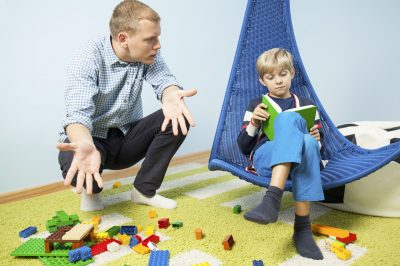I’m a mother of 3 kids (14,10,7), my question is how to help my kids to be organized and to make them help around?
Thank you
Answer
In this counseling answer:
•I recommend teaching them the mantra: “beginning, middle, and end”. Which usually equals: “prepare, do the thing, and clean-up”.
•When kids do stuff, YOU have to do that stuff with them to model for them.
•With all kids, rewards and punishment get them going/motivated – rewards usually work much better than punishments.
As-Salaamu ‘alaikum wa Rahmatullahi wa Barakatuhum,
This is such an important question because it is the classic problem of childhood.
Allah Made children learn by tearing things apart—SubhanAllah. Then, they have no consciousness yet about the need to put them back together again, SubhanAllah!
So, we really have to be patient and we need to be around to deal with that. It is so hard for working-moms (working outside the house, that is) to have the time it takes to teach our small children how to be thorough.
Most of us just clean up behind them because we don’t have time to teach them by walking them through the process of reconstruction each time they tear things apart, over and over and over again.
I don’t know if you are a working mom, but, whatever it is that you do, this process does not change. It takes time whether you have the time or not, so don’t be mad at them or yourself if you don’t have the time.
Just be clear about your limitations and merciful with yourself and them accordingly, and that goes for both parents, inShaAllah.

So, the way I recommend approaching this reality is teaching them the mantra: “beginning, middle, and end”. Which usually equals: “prepare, do the thing, and clean-up”. Nothing, but nothing can escape these three steps.
Every single process on the face of the earth has to go through these three steps. So, the sooner they—and you—and we all—get our in line with expecting to have to be a slave to this formula, the sooner we will all be able to deal with life better, and not abort that process halfway through, or truncate it in the middle, etc. with emotional baggage or lack of understanding, etc. – InShaAllah.
So, using the mantra of “prep, do, and clean-up”, or “beginning, middle, and end”, or any variation on that theme, you can then be able to ask them if they did all the steps necessary in “life”?
If you can get that step process as a “habit” in their minds, then, whenever they approach anything, including cleaning, they will have some forethought, some perspective of what is needed and what to expect whenever they approach any project or conversation, or meal, or anything.
However, when kids do stuff, YOU have to do that stuff with them to model for them. You can talk them through it too by asking them: “Did you prep? Did you do the thing? Did you clean up?”
Since none of your children are under the age of 7, they should all have the capacity to understand the above concept – BUT, they may not have the habit yet (they do not, otherwise you would not be asking this question).

Sometimes, other problems arise. For instance, some people think that it is “male” to not clean up behind yourself, i.e., that it is “women’s work”.
That is not Islam! If you think it is, write to the scholars on this website for proof that it is not Islamic but a cultural misconception of the roles of men and women in Islam.
If you don’t think it, your male children may still have seen this idea around them and imitate it, in which case you will need to “prove” to them (with Q and H) that this is not Islam but a cultural idea that is not healthy (because it is not Islam).
With the 14-year, you can probably use the argument that it is easier to find something in a timely manner when you need it if the room is clean—as compared to needing to “tear the room apart” to find something.
Check out this counseling video
With all kids, rewards, and punishment get them going/motivated – rewards usually work much better than punishments.
Some ideas of rewards are: healthy (honey) candy, coins (nickels, dimes and quarters all add up), 10 minutes on a healthy (Muslim) video game, 10 minutes of you reading to them, or 10 minutes of them reading to you, 15 minutes shooting hoops with Dad, candles/candlelight at dinner …. etc. Whatever works for your particular children.
Some ideas of punishments are: taking back the coins they earned, being grounded from playing with friends and/or from playing (Islamic) video games.
Because kids need physical movement, I don’t recommend restricting their outdoor activities. Separation from the group is particularly painful for children.
So, if they have to eat separately from the rest of the family at dinner time that can really matter to some of them.
One of my children loved to be alone, so telling her to go to her room was not a punishment for her. The only way I could get my son to listen to me as if I made him stand in the corner on one foot.
NOTHING but nothing else worked with him. All that to say, you have to know your particular child’s likes and dislikes and “work them”—there is no cookie-cutter remedy for all children.
But, there are a few standard principles: TIME is needed, which means patience is needed. We learn from repetition! And we learn from our mistakes. As painful and hard as that is to deal with, it is true.
So don’t cry over spilled milk, celebrate it. Just kidding. Don’t celebrate it because that would give the wrong message.
But, it is very important not to get mad because it was a mistake and does not deserve the scolding.
It does deserve that you say something like “Live and learn” so that the child knows that you understand that it was a mistake and it should not happen, i.e., that they can learn how not to spill milk from that experience.
It only takes one experience of getting burned by a stove for a child to learn, forever after that, that a stove is hot (not that I am recommending that you facilitate that process – only if that happens by accident, and that too should be protected against!).
Allah Make it Easy for you!
***
Disclaimer: The conceptualization and recommendations stated in this response are very general and purely based on the limited information provided in the question. In no event shall AboutIslam, its counselors or employees be held liable for any damages that may arise from your decision in the use of our services.
Read more:


